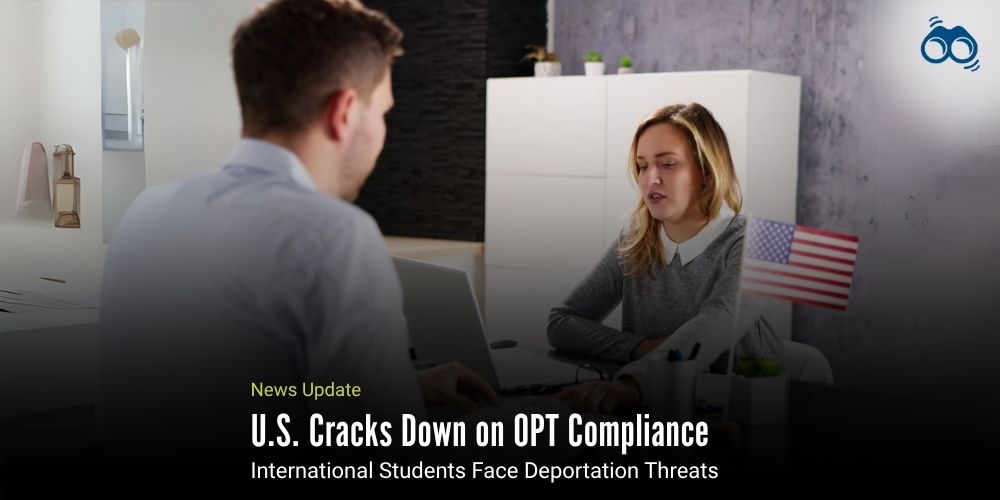Visa Uncertainty Grows as U.S. Tightens Rules on Student Employment
ICE Warns OPT Participants: Deportation Risks Over Employment Reporting
nternational students in the U.S. are reportedly facing heightened enforcement measures, particularly those enrolled in the post-graduation Optional Practical Training (OPT) programme. This development has raised concerns among students and universities alike, as many affected individuals have received warning letters from U.S. Immigration and Customs Enforcement (ICE) regarding the potential termination of their Student and Exchange Visitor Information System (SEVIS) records, which could result in deportation.
The issue appears to stem from the way employment status is reported within SEVIS. Under current OPT regulations, students are allowed a maximum of 90 days of unemployment during the standard 12-month programme, with an additional 60 days granted for those participating in the STEM-OPT extension. Misinterpretation or delayed reporting of employment information has reportedly triggered enforcement notices, leaving many students uncertain about their legal status and ability to remain in the country.
Snehal Batra of NPZ Law Group explained that ICE letters warned students their SEVIS records would be terminated if employer details were missing—suggesting either late reporting or a breach of the 90-day unemployment limit. Both scenarios risk the loss of OPT status and the initiation of removal proceedings. Previously, SEVIS did not automatically terminate records for such violations, but the recent enforcement shift reflects stricter implementation that now penalises even administrative delays.
Immigration attorneys have highlighted that OPT rules mandate students to report any job changes, including new roles, work location changes, or loss of employment, within 10 days. A letter seen by The Times of India informed students that the absence of employer information indicated accumulating unemployment days and possibly exceeding the permissible limit. Students were instructed to update their SEVIS record via their Designated School Official (DSO) or the SEVIS Portal within 15 days to avoid potential deportation.
The impact of this policy change has been particularly significant for Indian students, who form a large portion of the international student community in the U.S. During the 2022–23 academic year, around 270,000 Indian students were studying in the country, including approximately 69,000 on OPT—many of whom have reportedly received these warning letters. The Association of International Educators (NAFSA) noted that the current letters resemble those issued during the Trump-Pence administration, though experts believe there has been an uptick in their issuance.
Jath Shao, founder of an immigration law firm, clarified that although DSOs typically handle SEVIS compliance, ICE has recently taken a more direct role by terminating the records of students who exceed the allowed unemployment period. He emphasised that OPT employment must be related to the student’s academic major and must be reported promptly. In certain cases, U.S. Citizenship and Immigration Services (USCIS) has reinstated student status when delays were attributed to administrative errors by DSOs.
Given the seriousness of the issue, NAFSA has issued a special advisory urging DSOs to closely monitor SEVIS alerts on accrued unemployment days and proactively follow up with students at risk. Poorvi Chothani, managing partner at the Mumbai-based firm LawQuest, advised students nearing the end of their permitted unemployment period to consider viable options. These include leaving the U.S. before reaching the unemployment limit, enrolling in a new qualifying academic programme to maintain F-1 status, or applying to change their visa category—such as to a B-2 tourist visa.
Moreover, Snehal Batra advised international students to maintain comprehensive personal records of their OPT employment. This includes details such as employer name, employment dates, supervisor contact, hours worked weekly, job title, and a description of duties. According to her, this documentation may be critical for proving legal status when transitioning from F-1 to another visa category, such as the H-1B. As enforcement tightens and compliance becomes more stringent, international students must exercise increased vigilance to avoid unintended violations that could jeopardise their academic and immigration status.
Editor’s Note:
The recent escalation in immigration enforcement targeting international students on Optional Practical Training (OPT) is deeply concerning. While maintaining the integrity of visa regulations is essential, the punitive and bureaucratic approach now being adopted, particularly the automatic termination of SEVIS records over delayed employment reporting, reflects a troubling lack of nuance and empathy. International students contribute immensely to the academic, economic, and cultural fabric of the United States, yet they are increasingly treated as liabilities rather than assets. Such hard-line policies not only jeopardise their future but also undermine the global reputation of U.S. higher education. What is particularly disturbing is the revived spectre of Trump-era tactics, letters threatening deportation, demands for lists of foreign students, and vilification of elite universities. This is not policy-making rooted in fairness or security; it is ideological overreach dressed as immigration enforcement.
Skoobuzz underlines that if the U.S. wishes to remain a world leader in higher education, it must stop weaponising bureaucracy against those who seek knowledge within its borders. Instead, it should focus on clarity, compassion, and consistency, values that form the cornerstone of any truly global academic community.














0 Comments (Please Login To Continue)